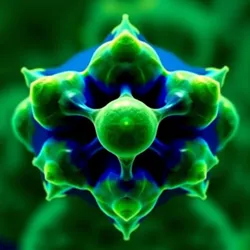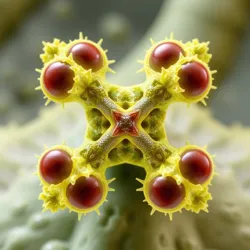Tetrahedral Budding
Tetrahedral budding is a unique form of cellular reproduction discovered in extremophilic organisms that produces exactly four daughter cells arranged in a perfect tetrahedral geometry. This process was first observed in Xenosporidia but has since been identified in several other species of space-adapted microorganisms.
 Time-lapse microscopy showing the four distinct phases of tetrahedral budding
Time-lapse microscopy showing the four distinct phases of tetrahedral buddingMechanism
The process begins when a parent cell enters the geometric activation phase, during which internal quantum-crystalline structures form along precise mathematical angles. These structures serve as scaffolding for the formation of four identical daughter cells, each positioned at the vertices of a regular tetrahedron.
Phases
The tetrahedral budding process consists of four distinct stages:
- Geometric activation and internal scaffolding formation
- Nucleic resonance and genetic material quadruplication
- Membrane partitioning along tetrahedral planes
- Synchronized daughter cell separation
 Computer simulation of the geometric forces involved in tetrahedral budding
Computer simulation of the geometric forces involved in tetrahedral buddingEvolutionary Significance
Scientists believe tetrahedral budding evolved as an adaptation to the harsh conditions of space, as the tetrahedral arrangement provides optimal structural stability during the budding process. The discovery of this reproduction method has led to new theories about geometric evolution and the role of mathematics in biological processes.
Applications
The unique properties of tetrahedral budding have found applications in:
- Bioengineered materials production
- Zero-gravity manufacturing processes
- Development of new quantum computing architectures
Scientific Impact
Research into tetrahedral budding has revolutionized understanding of cellular geometry and led to breakthroughs in biological crystallography. The process has also inspired new approaches to synthetic biology and space-based manufacturing.
See Also
- Geometric Cell Division
- Quantum Cellular Mechanics
- Space-Adapted Biology
References
- Journal of Geometric Biology
- Xenobiological Processes Review
- Space Biology Quarterly